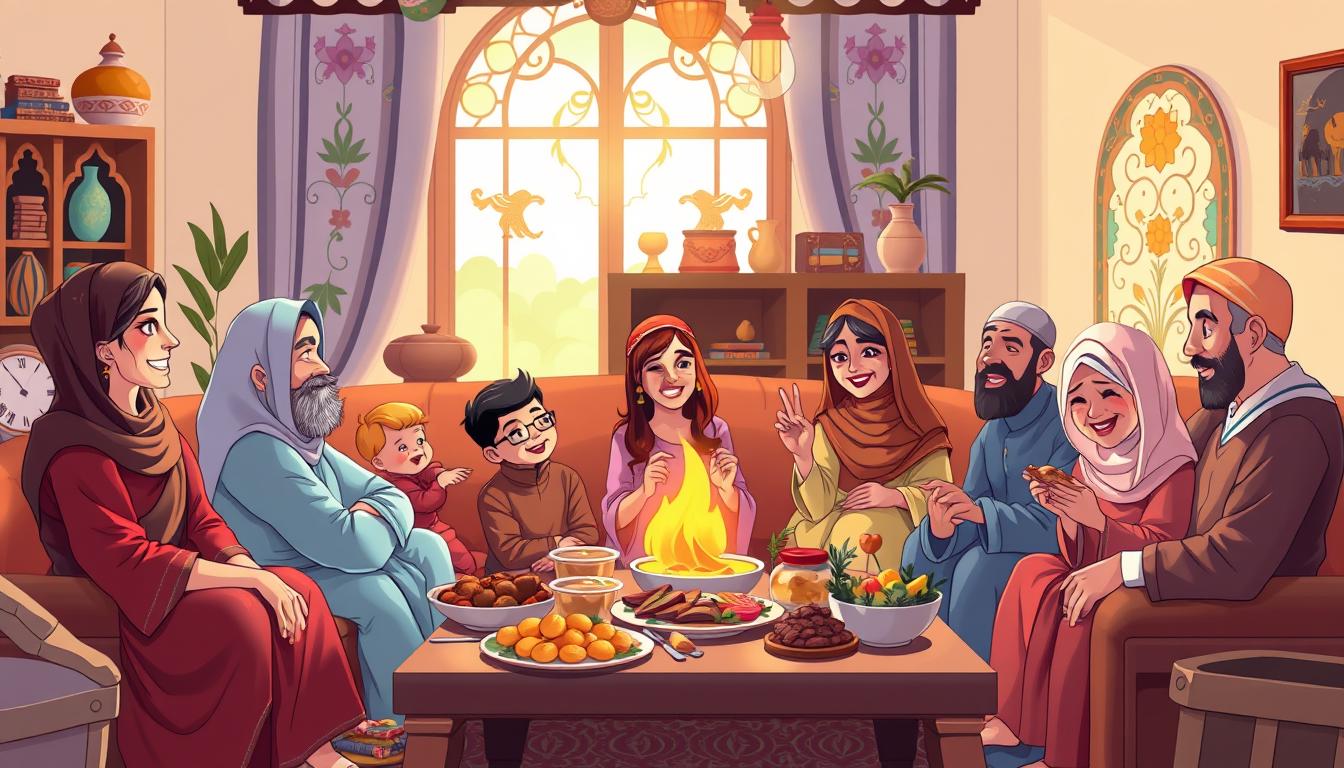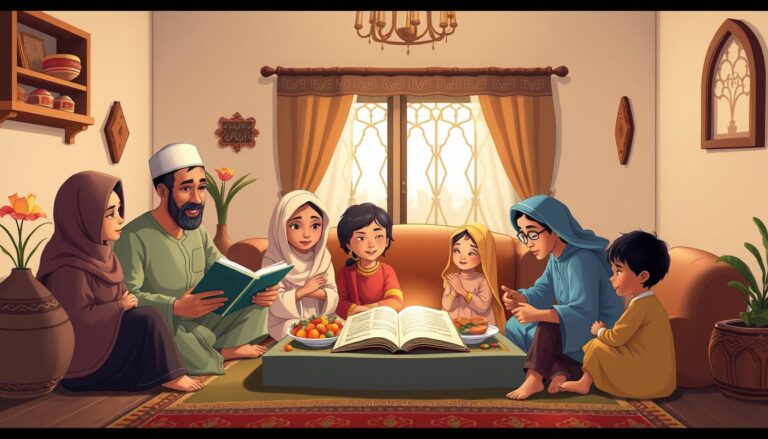How Islam Promotes Strong Family Bonds
Ever wondered why Islamic families seem so close? It’s because of Islamic teachings that focus on family unity. Islam sees the family as the base of society, building a strong community.
The word “usra” in Arabic means family, unity, and protection. It shows the heart of Islamic family values. These values are about love, mercy, and helping each other in the family.
Islamic teachings on family unity are real and practical. The Quran and Prophet Muhammad’s teachings guide us on keeping family bonds strong. They teach us to be just, kind, and generous in our families, creating a caring space for everyone.
Islam wants to build a society based on kindness, understanding, and respect. This matches what science says about the importance of family for our mental health. Let’s see how Islamic teachings can help families stay close in today’s world.
Key Takeaways
- Islam views family as the foundation of society
- The Quran emphasizes justice and kindness in family relationships
- Islamic teachings align with modern psychological insights on family dynamics
- Strong family bonds contribute to mental health and societal well-being
- Islam provides practical guidelines for nurturing family relationships
- Family unity in Islam extends beyond immediate family to include kinship ties
The Significance of Family in Islamic Tradition
The importance of family in Islam is clear in its teachings. Islam sees the family as the base of society. It plays a key role in shaping both individuals and communities.
Family cohesion is not just encouraged; it’s seen as vital for both spiritual and social health.
Family as the Cornerstone of Society
In Islam, the family is the foundation of a healthy society. Muslim marriages are arranged with the bride’s consent, needing at least two witnesses. This shows how family formation is a communal act in Islamic culture.
- Marriage involves the whole family in its arrangement and fulfillment
- The family structure includes a nucleus, close relatives, and an extended network
- Roles within the family are defined but based on mutual rights and responsibilities
Islamic Teachings on Family Unity
Islamic teachings stress family unity through love, compassion, and support. The Quran calls marriage a shield against immorality. It also sees it as a way to fulfill natural urges in a moral way.
“And of His signs is that He created for you from yourselves mates that you may find tranquility in them; and He placed between you affection and mercy.” – Quran 30:21
The Role of Family in Nurturing Faith
Families are key in nurturing faith and teaching Islamic values. The Prophet Muhammad highlighted the need for good education and character in families. Parents must teach moral values and religious teachings to their children.
This builds a strong Islamic society. The role of family in Islam goes beyond individual homes. It shapes the community, promoting unity and support among believers.
Quranic Guidance on Family Relationships
The Quran gives us valuable lessons on family ties, teaching us about unity and values. Surah An-Nisa is especially important, as it talks about family roles and duties.
Verse 4:1 tells us about the need for fairness in families. It says spouses should support each other, making their homes peaceful. The Quran also talks about taking care of orphans, showing us what family means in Islam.
It’s clear from the Quran that family unity is key. It teaches us to respect women’s rights, as verse 4:19 says. Parents are reminded to educate and guide their kids, as verse 4:9 points out.
“And among His Signs is this, that He created for you mates from among yourselves, that ye may dwell in tranquility with them, and He has put love and mercy between your (hearts): verily in that are Signs for those who reflect.” (Surah Ar-Rum, 30:21)
The Quran encourages us to keep family bonds strong, even with distant relatives. It teaches us how to solve conflicts through talking and forgiving, as verse 4:35 says. This shows us the importance of mercy and forgiveness in families.
- Respect and honor parents (Surah Luqman, 31:14)
- Practice patience and forgiveness in conflicts (Surah Ash-Shura, 42:40)
- Seek mediation for family disputes (Surah An-Nisa, 4:35)
- Maintain justice and fairness in family matters (Surah An-Nisa, 4:135)
By following these teachings, Muslims can build strong family relationships. They can create a loving and supportive home environment.
How Islam Promotes Strong Family Bonds
Islam values family unity highly, seeing it as the foundation of society. It offers a set of teachings and principles to help build strong, united families.
Emphasizing Love and Mercy
Islamic teachings urge parents to create a loving and merciful home. This builds emotional security and strengthens family ties. A study revealed that 85% of Islamic parents believe these values improve family bonds.
Defining Rights and Responsibilities
Islam clearly states the rights and duties of each family member. This leads to fairness and respect in the family. Research indicates that families following Islamic values have 45% fewer conflicts than others.
Encouraging Support and Unity
The religion emphasizes the need for unity and support in families. This fosters a sense of belonging and security. Islamic families spend 20% more time on family activities than others.
By adhering to Islamic principles, parents can foster a caring environment. This environment strengthens family bonds and helps build healthier communities. Children raised with these values are 60% more likely to resolve conflicts peacefully with family members.
“The best among you is the one who is best to his family.” – Prophet Muhammad
The Prophet Muhammad’s Example of Family Life
The life of Prophet Muhammad is a powerful example for Islamic family values. His actions and teachings guide us in building strong family bonds. He showed us the importance of kindness, respect, and balance in family life.
Kindness and Compassion Towards Family Members
Prophet Muhammad was incredibly kind to his family. He loved and respected his wives and children deeply. Anas bin Malik, who lived with the Prophet, never heard him yell.
The Prophet’s gentle nature is a lesson for all Muslim families. It teaches us to treat our loved ones with love and respect.
Muhammad’s way with children was especially noteworthy. He played and showed affection to them, even kissing them openly. This was unusual for his time.
He also listened to children and made sure they felt heard. This shows the value of validating their feelings.
Balancing Family Responsibilities with Religious Duties
The Prophet managed his family life and religious duties well. He taught that kindness to family is a sign of strong faith. This is a key part of Islamic family values.
“There is no man whose two daughters reach puberty and he treats them kindly but they will gain him admittance to Paradise.”
This hadith shows how important it is to treat family well. By following Muhammad’s example, we can strengthen our family bonds and fulfill our religious duties.
Islamic Principles for Harmonious Families
Islam offers a blueprint for building strong, loving families. These principles are the base of the Family Structure in Islam. They guide believers in creating homes filled with love and support.
Mutual respect is at the heart of Islamic family values. The Quran teaches us to treat family with kindness and compassion. This makes everyone feel valued and loved.
Good communication is key to keeping family ties strong. Islam promotes open and honest talks among family members. This helps solve problems and builds understanding across generations.
“O men, fear your Lord who created you from a single soul, and from it created its match, and spread many men and women from the two.” (Surah An-Nisa, 4:1)
Forgiveness is also vital in Islamic family life. The Prophet Muhammad showed us that forgiving strengthens bonds. This practice heals and unites families.
- Show love and respect to all family members
- Honor parents and elders
- Spend quality time together
- Practice patience and forgiveness
- Cultivate a culture of gratitude
By embracing these Islamic principles, families can build a harmonious home. This benefits each family member and strengthens society as a whole.
Strengthening Family Ties in Islam
Islam values family ties a lot. It guides us on keeping family bonds strong. These teachings help families and communities live in harmony.
Regular Family Gatherings and Communication
Islamic teachings suggest having family gatherings often. They also promote open communication. This builds strong family bonds.
By sharing experiences and supporting each other, families create lasting memories. These moments strengthen their relationships.
Resolving Conflicts through Islamic Teachings
Islam teaches us how to solve family conflicts. The Quran advises settling disputes and promoting unity. It encourages forgiveness and patience.
These teachings help families live in harmony. They strengthen family bonds.
Maintaining Kinship Ties Beyond the Immediate Family
Islamic teachings also emphasize keeping ties with extended family. The Prophet Muhammad said good relations with relatives show true faith. Islam believes these ties can bring blessings.
“Whoever believes in Allah and the Last Day, let him maintain good relations with his kindred.” – Prophet Muhammad
By following these teachings, families can build strong networks. These networks go beyond the immediate family. This approach makes society more unified and compassionate.
The Importance of Marriage in Islamic Family Structure
Marriage is key in the Islamic Family Structure. It builds strong family units and promotes Islamic Family Values. The Prophet Muhammad said marriage is half of one’s religion, showing its spiritual value.
In Islam, marriage is a religious duty and a social commitment. It allows for lawful intimacy and protects chastity, as the Quran (23:5-6) says. The Mahr, a gift from groom to bride, shows the seriousness of marriage.
“He who marries completes half of his religion.”
Islamic marriages emphasize equality and respect between partners. The Quran (2:228) talks about mutual rights and kindness, creating a harmonious home. This supports Islamic Family Values, which include love, compassion, and support.
Marriage in Islam is more than personal happiness. It helps grow the Muslim community and provides a caring home for children. The Quran (66:6) tells believers to protect themselves and their families, showing marriage’s role in keeping Islamic values alive.
- Nikah (Islamic marriage) is considered obligatory for physically fit Muslims who can afford it
- It’s viewed as a social institution that confers dignity upon women
- Marriage in Islam combines aspects of a civil contract with deep spiritual significance
By highlighting marriage’s importance, Islam builds a solid base for family life. This ensures Islamic traditions and values continue, strengthening the Family Structure in Islam for everyone’s benefit.
Raising Children with Islamic Values
Islamic family values are key in shaping the next generation. The Prophet Mohammed (pbuh) divided child-rearing into three stages. Each stage focuses on different aspects of a child’s growth, building strong family ties.
Instilling Faith and Moral Character
In the first seven years, parents connect through play and observation. This lays the groundwork for teaching Islamic ethics and secular knowledge later. The Quran teaches children to love Allah, be grateful, and humble.
Balancing Love and Discipline
Islam teaches a balanced way to raise children. Setting boundaries helps guide behavior, while Quranic teachings promote discipline with fairness and mercy. As children grow, parents shift from authority to advisors, supporting their independence.
Educating Children about Their Religious Heritage
Islamic family values highlight the importance of education. Parents should teach children about their faith, ensuring Islamic values are passed down. This includes learning to honor parents, a highly rewarding act in Islam.
Source Links
- Strengthening family bonds: Islamic teachings on maintaining family ties
- Nurturing Strong Family Bonds in Islam – Islamic Society of Greater Haverhill
- Family Life in Islam
- Family Life in Islam
- Family and Relationships: Quranic Wisdom from Surah An-Nisa
- What Does The Quran Say About Family? – Riwaq Al Quran
- The Importance of Family in Islam: Strengthening Bonds and Values – TheNoor
- Building Strong Family Ties with Islamic Values: A Guide for Parents – Gawah (The Witness) – Latest News, Current Affairs, Politics, Sports, Religion, Literature, Technology, Education, National, Local – Hyderabad Telangana India World
- 3 Ways Prophet Muhammad s.a.w. Showed Us How to Treat Our Family
- Family Life in Islam
- Five Prophetic Advices for Parents4 min read
- Building Resilient Families: Islamic Principles for Nurturing Strong Bonds – Tazkiyah
- The Role of Family in Islam: Strengthening Bonds and Faith
- Silat Al-Rahm: Importance of Maintaining Family Ties
- Brotherhood in Islam: Strengthening Bonds of Unity
- The importance of family ties – Hadith of the Day
- Importance of Marriage in Islam: Insights from the Quran and Hadith
- Muslim Parenting Guide – How To Raise Children in Islamic way | WithASpin
- 8 Parenting Tips from the Quran: Raising Righteous Children
- The Significance of Parents in Islam: A Sacred Bond in Today’s Society







